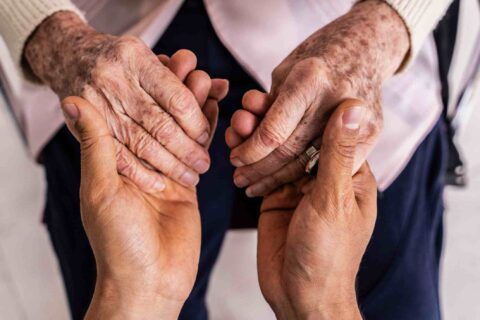Accepting Difficult Circumstances and Establishing Peace
Accepting Difficult Circumstances and Establishing Peace
When a loved one enters hospice care, it can be difficult for families to experience a peaceful transition amidst a whirlwind of emotions. From grief and fear to confusion and overwhelming sadness, it’s hard to manage what feels like the weight of the world. It’s completely natural to feel uncertain about what lies ahead. Even though it comes with unique challenges, this time offers opportunities for meaningful connection, healing, and finding peace.
First, knowing you’re not alone in this experience while working with Agape Hospice NW should provide comfort. Our hospice care is designed to support your loved one, but our holistic approach guides your entire family toward acceptance and tranquility during this sacred time.

Understanding Grief and Loss in Hospice Care
Grief doesn’t wait for loss to occur. It often begins the moment we recognize that our time with someone we love is limited. This anticipatory grief is a normal response that allows us to begin processing the reality of what’s happening. Acknowledging these feelings early in hospice care can help families navigate their emotions more effectively.
Everyone grieves differently, and there’s no “right” way to experience these emotions. Some may feel angry, others may withdraw, and some might find themselves cherishing every moment more deeply. Understanding that grief is a personal journey helps families accept their individual responses without judgment.
Emotional and Spiritual Support Options
Emotional and Spiritual Care
Professional chaplains and spiritual counselors provide comfort regardless of religious background or beliefs. These trained professionals listen to concerns and fears while helping patients and families explore life’s meaning and provide spiritual guidance. They support both patients and families in finding inner peace and addressing existential concerns that often arise during end-of-life care.
Mindfulness Practices
Mindfulness techniques can significantly reduce anxiety and promote present-moment awareness. Simple breathing exercises, meditation, and gentle yoga can help patients and caregivers find calm amid emotional storms. These practices don’t require extensive training. Just five minutes of focused breathing can provide relief and clarity.
Support Systems That Make a Difference
Support Groups
Connecting with others who understand your experience can be profoundly healing. Support groups provide safe spaces to share feelings, learn coping strategies, and receive encouragement from those walking similar paths. Many find comfort in knowing their struggles are shared and understood by others.
Help From Volunteers
Trained hospice volunteers offer practical and emotional support, from providing companionship to assisting with daily tasks. These compassionate individuals often become trusted friends, offering respite for primary caregivers and additional emotional support for patients.
Family Counseling Sessions
Professional counselors specializing in end-of-life issues can help families navigate complex emotions and improve communication. These sessions provide tools for expressing feelings constructively and maintaining strong family bonds during challenging times.
Mental Health Counseling
Individual therapy is a valuable tool for processing grief, managing depression or anxiety, and developing healthy coping mechanisms. Mental health professionals experienced in hospice care understand the challenges families face and can provide targeted support.
Moving Toward Peaceful Transitions
Finding peace doesn’t mean eliminating sadness or fear. The process is focused on accepting these emotions as part of a meaningful journey. Peaceful transitions often involve celebrating your loved one’s life, expressing gratitude for shared memories, and focusing on comfort and connection rather than fighting the outcome of an end-of-life condition.
Families can find comfort now by creating lasting memories through photo albums, recorded conversations, or written letters, which can continue providing peace in the future. These activities help families focus on love and connection rather than loss.
What Emotional Support Options Are Available for Families During Hospice Care?
Hospice programs offer counseling, support groups, spiritual care, volunteer companionship, and bereavement services. Many also provide family meetings to address concerns and coordinate care.
How Does Spiritual Care Help Patients and Families in Hospice?
Spiritual care addresses existential concerns and provides comfort through faith traditions. The goal is to help individuals find meaning and peace regardless of their religious background.
How Can Mindfulness Practices Promote Peace for Hospice Patients and Caregivers?
Mindfulness reduces anxiety by promoting present-moment awareness. It’s a practical tool for managing overwhelming emotions through breathing exercises and meditation.
What Steps Can I Take to Stay Resilient While Caring for a Loved One?
A few important things to remember are to prioritize self-care and accept help from others. Even during this difficult time, maintaining social connections is critical. Just because you take breaks and focus on healthy time for yourself doesn’t mean you care less.
What Does a “Peaceful Transition” Look Like in Hospice Care?
Everyone finds peace differently, but the process often involves a combination of comfort, dignity, emotional support, spiritual care if desired, and the presence of loved ones in a calm, supportive environment.
Connect With Agape Hospice NW
You won’t have to navigate hospice care alone when you partner with Agape Hospice NW in Portland, OR. Contact us today to learn more about our services and how we can help you find peace and comfort while caring for your loved one during this important chapter of your family’s story.


